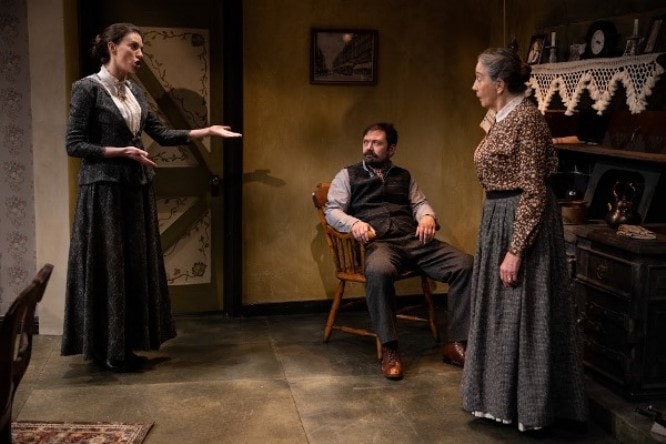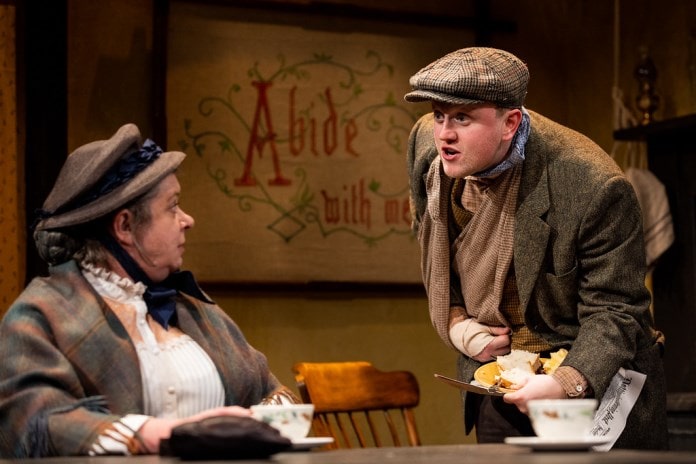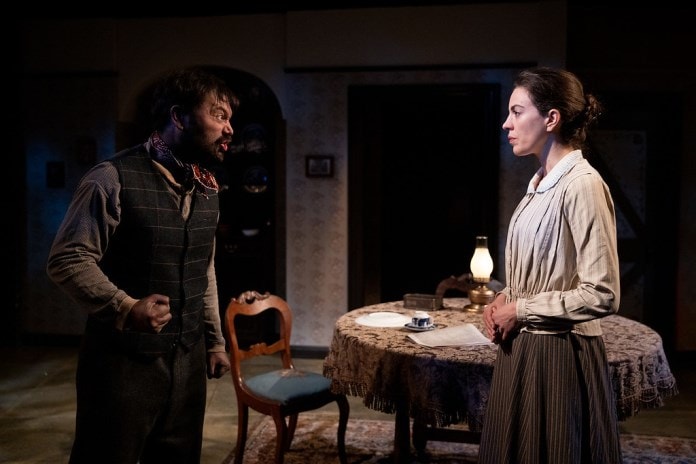After keeping audiences connected to its mission of preserving under-represented plays and forgotten classics with a pandemic-time series of archival streams of its previous productions, Mint Theater Company has returned to live in-person performances with a riveting revival of D.H. Lawrence’s The Daughter-in-Law, playing a limited Off-Broadway engagement at New York City Center. First presented by the Mint in 2003, the English author’s earliest play, written in 1913, remained unpublished and unproduced until after his death, not appearing in print util 1965, in an edition of the complete plays of Lawrence, or making its stage debut until 1967, at London’s Royal Court Theatre.

The emotionally charged and psychologically driven semi-autobiographical story draws a parallel between the growing labor revolt and ultimately violent workers’ strike in the English mining town of Eastwood (where Lawrence was born) during the time of the Great Unrest, and the marital turmoil of the recently wed couple Luther, a working-class miner, and Minnie, an educated middle-class former governess, fueled by the influence and control of his mother Mrs. Gascoyne (Lawrence was the son of a miner and a woman of “good, old burgher descent” who “married below her” and with whom he was extremely close).
The familial tensions are exacerbated by the news from their neighbor Mrs. Purdy that her daughter is pregnant by Luther, with whom she had a dalliance before his marriage to Minnie, and is seeking a monetary settlement to help with her expenses. In defiance of his domineering mother, who encourages Mrs. Purdy to go directly to Luther and Minnie to tell them (and to cause further strains in their already troubled relationship), Luther’s younger brother Joe steps in to warn Luther and to do everything he can to get Minnie out of their home before Mrs. Purdy arrives. When the truth is finally exposed by a drunken Luther, conflicts explode and the titular daughter-in-law makes every attempt she can to save her marriage and to release her husband from the clutches of his mother, into her own.

Though the Freudian theme of maternal blame and female dominance doesn’t necessarily resonate with a more feminist contemporary audience, the period piece, which the playwright described as “neither a comedy nor a tragedy – just ordinary,” offers a provocative look at traditional cross-generational gender roles and socio-economic class structures that are both dramatic and laughable. Directed by Martin Platt, the play is presented in the authentic Ilson dialect of Britain’s East Midlands (dialect design by Amy Stoller), perfectly mastered by the outstanding cast, in contrast to Minnie’s more refined speech. And each character’s distinctive perspective is captured with emotional depth and complexity in the writing and acting, which helps us to understand why a couple that is so obviously mismatched would have ever gotten together in the first place or might choose to stay together.
As Mrs. Gascoyne, Sandra Shipley is outspoken and opinionated, always completely fluid and natural in her delivery, and never hesitating to dominate the conversation or to dictate authoritatively to her sons, neighbor, daughter-in-law, or even the cab driver who helps Minnie with her luggage (in a brief appearance by Seth Andrew Bridges). The more mild-mannered Mrs. Purdy, played by Polly McKie, is agreeable to following her friend’s advice to pay an unexpected visit on Tom and Minnie to apprise them of the pregnancy and to make arrangements with them for financial support on behalf of her daughter. Ciaran Bowling’s Joe simultaneously evinces his rebellious nature and discontent with his life and his work as a miner, voicing his desire to move to Australia, trying to counteract the domination of his mother, but fearing that, as the youngest of her sons, he will always be stuck under her thumb.

In the role of the embattled husband and son, Tom Coiner embodies a gritty Luther, prone to boorish behavior and outbursts of rage, refusing to wash off the dirty coalmining grime that covers his face and body before eating and sitting on the fine furniture at home, loudly slurping his soup, yelling uncontrollably, and ferociously destroying his wife’s valuable possessions. And Amy Blackman as the more cultivated Minnie holds her own against both Luther and his mother, openly expressing her discontent, calling out both of them for their unhealthy attachment, and ensuring that she has an alternate plan for her future, should her ill-advised marriage, cathartic insults, and efforts of conciliation fail.
Each outward portrayal is three-dimensionally rounded by an understanding of the characters’ internal struggles, as the actors slowly reveal their underlying motivations and insecurities, show a self-awareness of their flaws, and give a glimmer of hope for their crucial development, which could bring harmony to the family and fulfillment to their lives – but may or may not happen.
The cast is supported by a telling artistic design, with a set by Bill Clarke that clearly distinguishes between the simple kitchen and furnishings of the working-class Gascoynes and the tastefully appointed interior of Minnie. Costumes by Holly Poe Durbin likewise define the situations and personalities of the characters, and Jeff Nellis’s lighting and sound by Lindsay Jones further contribute to the times, plot points, and moods of the story.
The Mint’s powerful production of The Daughter-in-Law offers a rare opportunity to see a lesser-known work by D.H. Lawrence and to witness the gripping performances of an exceptionally skilled cast.
Running Time: Approximately two hours and 20 minutes, including an intermission.
The Daughter-in-Law plays through Sunday, March 20, 2022, at the Mint Theater Company, performing at New York City Center, Stage II, 131 West 55th Street, NYC. For tickets (starting at $35), call (212) 581-1212, or go online. Everyone must show proof of COVID-19 vaccination and a photo ID to enter the building and must wear a mask inside at all times.





